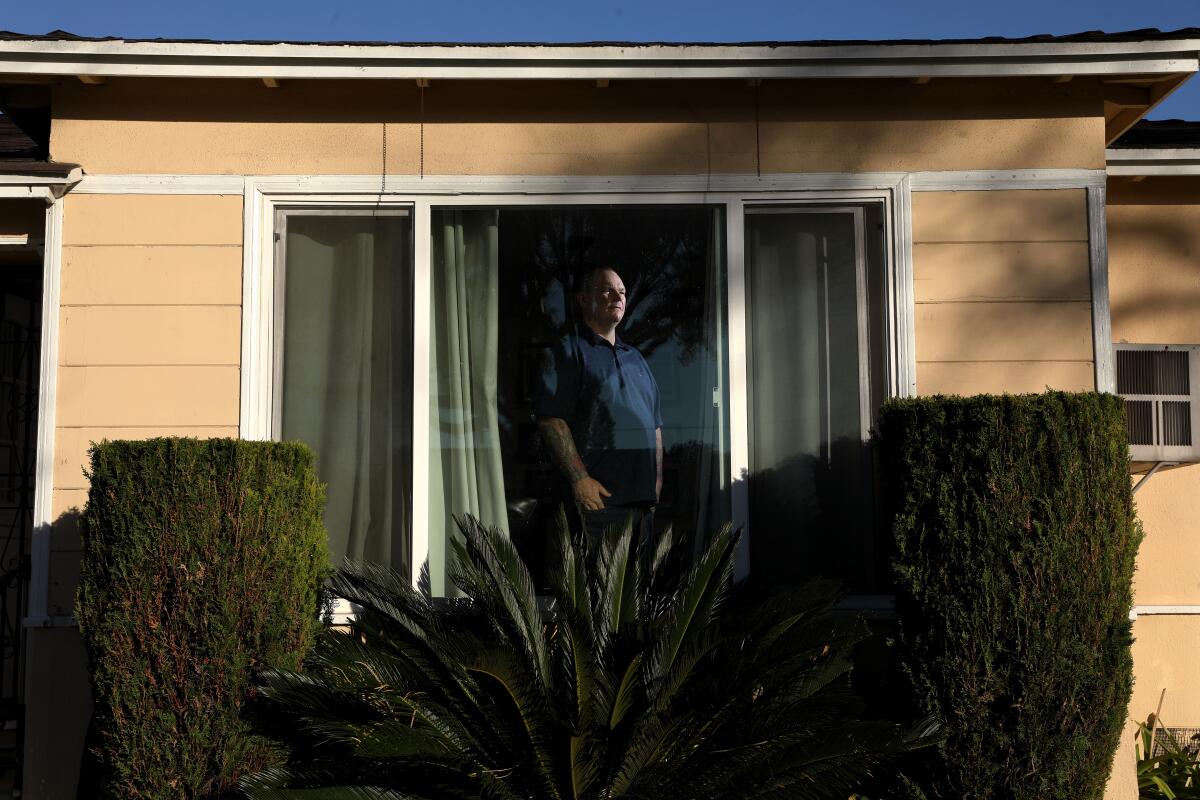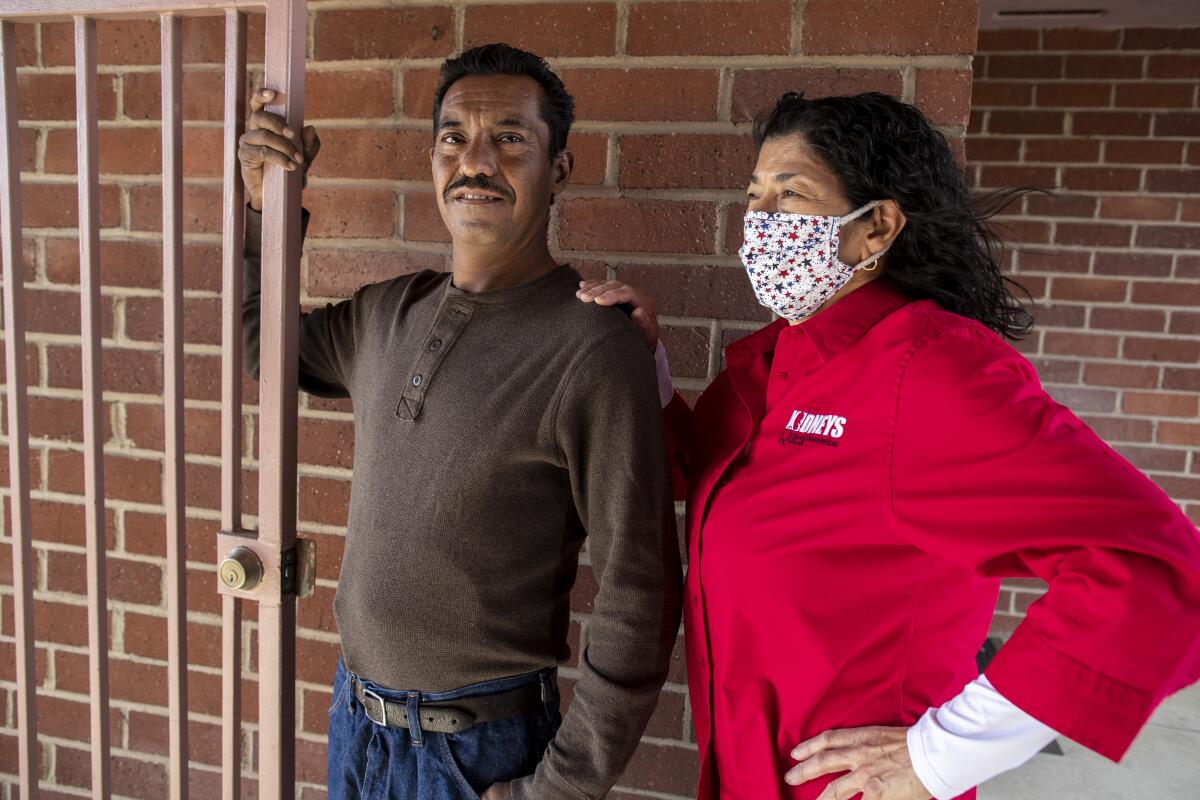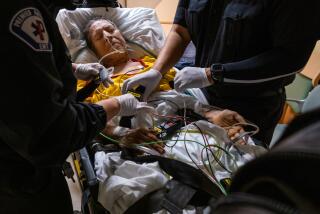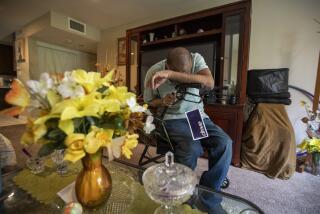As COVID-19 fills ICUs, chronically ill patients suffer ‘ripple effect’ of delayed surgeries

- Share via
In the early years of his illness, as his kidneys began to shrink and toxins coursed through his blood, the same four words often floated through Miguel Rangel’s mind: “I’m going to die.”
Although some people live much longer, the average life expectancy of dialysis patients is five to 10 years, and Rangel, who has last-stage chronic kidney disease, lives with constant pain and for the last decade has gotten dialysis nightly via a catheter into his abdomen. Still, the 43-year-old electrician, who lives in San Fernando, has trained his mind to linger on hope.
“This life is beautiful,” he often repeats as a mantra. “I want to keep going.”
But for now, he’s in a holding pattern — one exacerbated, in part, by the COVID-19 pandemic, which has ushered in a new level of anxiety for many patients with underlying conditions. Like Rangel, they are confronting a cascade of delayed surgeries, while also weighing hard choices between risking exposure to the virus or further putting off important, at times lifesaving, health actions.
Rangel was scheduled to have a parathyroid gland removal in mid-December at Los Angeles County-USC Medical Center, a procedure that will help alleviate his severe bone pain and improve his quality of life as he continues to await a transplant surgery. But it had to be postponed because he got an infection in his abdominal wall a few days before the scheduled surgery.
When he asked about rescheduling, the hospital said it would get him back on the surgery schedule as soon as it could but warned him to expect delays — facilities and staff were being stretched to their limits, and some procedures had to be pushed back a bit.
“Because of COVID,” they told him.

Throughout the pandemic, health officials have pleaded with the public, reminding them that by wearing masks and staying at home they’re doing their part to prevent hospital overcrowding — a scenario that could quickly become catastrophic, officials warned, forcing doctors to make devastating moral and medical calculations about who would get lifesaving care.
Still, hospitals in some parts of the nation, including Los Angeles, have teetered dangerously close to such situations, and to avoid severe rationing in ICUs, hospitals have turned to another form of triage: They began postponing elective and non-emergency surgeries.
It was a best-of-hard-options choice, many healthcare experts agreed — a necessary step for conserving critical resources such as ventilators and oxygen, as well as a way to free up doctors and nurses who were being stretched increasingly thin.
But deciding whether a procedure is truly elective and how long it can be pushed back without causing harm always involves a certain level of subjectivity, and the postponements, no matter the cause, often translate into stressful and scary delays for patients, particularly those with underlying health conditions.
A recently updated order from the California Department of Public Health directed hospitals in regions that meet certain criteria, including having zero available ICU beds, to use a tiered system recommended by the American College of Surgeons to categorize the urgency of all elective procedures. Once ranked, the procedures that would require an overnight hospital stay should be delayed in descending order of priority, the order said, and cases should be “triaged by the clinical judgment of the physician.”
Those types of triage decisions are always somewhat subjective, said Dr. Will Ross, a professor at Washington University School of Medicine in St. Louis, where he is also associate dean for diversity.
In recent months, as hospitals grappled with discussions over rationing, Ross, who has a master’s of public health, often thought back to research he did on a slice of medical history now widely condemned by bioethicists. In the 1960s, he explained, the Seattle Artificial Kidney Center created a committee — now sometimes called the “God Panel” — that voted on which patients would get access to then rare and expensive dialysis treatment.
The committee of six men and one woman made their decisions by judging each patients’ “social worth.” Ethicists later showed that those patients with the best chances of being accepted were middle-class white men, according to a 1991 Times article that examined the committee.
While such an unstructured, subjective decision-making process is now widely condemned, access to healthcare in America is still shaped by deep racial and socioeconomic inequities — trends that have held devastatingly true throughout the pandemic. Black, Latino and Native people have died of COVID-19 at disproportionately high rates in the U.S., and early data show racial disparities in who has gotten coveted, potentially lifesaving vaccines against the disease.
Research has shown that patients of color are less likely to have their pain taken seriously, Ross said, noting that because healthcare providers, like everyone, see the world through their own overt and unconscious biases, it’s critical for doctors in triage situations to interrogate their assumptions.
“The quicker the decision-making has to be, the greater likelihood there will be bias in the assessment,” said Ross.
The full scope and potential long-term impacts of the delayed surgeries during COVID-19 are still difficult to quantify.
Neither the state’s public health department nor the California Hospital Assn. keeps data on how many such procedures have been delayed statewide. Representatives from seven of the largest hospitals in L.A. County contacted by The Times either didn’t respond, declined to answer or hadn’t yet compiled data on how many surgeries they’d had to postpone during the pandemic.
The county’s Department of Health Services said the specific number of surgeries postponed at the four-county run facilities — County-USC, Harbor-UCLA Medical Center, Olive View-UCLA Medical Center and Rancho Los Amigos National Rehabilitation Center — wasn’t immediately available. But the number of total surgeries, including emergencies, performed in December and the first two weeks of January had dropped by roughly 25% — an estimated 1,100 fewer surgeries — compared with the same time frame the year before.
In some cases, the county said, patients asked to push back operations and in other instances the county’s overburdened hospitals requested the delays — a situation Dr. Anish Mahajan, chief medical officer at Harbor-UCLA, described as doctors being “stuck in a bind you can’t control.”
“We all feel the agony of our patients,” he said. “They’re waiting and they need their care, but there’s this massive pandemic.”
During the recent surge at Harbor-UCLA — at one point it was stretched to 150% of its normal ICU capacity, he said — the hospital created a list of all pending procedures and asked doctors to prioritize them based on a key factor: If the patient doesn’t get surgery within two weeks could they be at risk of serious harm?
If the answer was yes, they went into Tier 1. If the procedure could wait a month, they went into Tier 2, and so on down to Tier 5, he explained, noting that the goal was to minimize — and hopefully outright avoid — significant harm through aggressive prioritization. Asked if he thought they’d managed to do that so far, he answered matter-of-factly, “I think we’re doing as good a job as we can on that.”
Because Harbor-UCLA and County-USC are Level 1 trauma centers, he added, the hospitals sometimes receive so many victims of car accidents and violence in a single day that even some Tier 1 procedures occasionally have to be pushed back a bit because the operating staff is handling other emergency cases.
Some physicians who are doing fewer operations — orthopedic surgeons, for example, who typically focus on hip and knee replacements, which fall in the lower-priority tiers — now spend their shifts in the ICU, Mahajan said, helping with the delicate task of flipping desperately ill COVID-19 patients onto their stomachs to improve lung function.
Even though case counts have begun to level off, Mahajan urged the public to remain vigilant with masks and social distancing, saying he was worried that, as the highly transmissible COVID-19 variants continue to spread, hospital censuses could spike again.
“We’ll have a bigger problem on our hands,” he said. “We won’t be able to revert to getting back to these surgeries.”
::
Finding bed space in Los Angeles in recent weeks devolved into a terrifying game of “Tetris.” One hospital transformed a meditation room into an overflow space with cots; another had to temporarily shut its doors to all ambulance traffic. Doctors at a third facility argued loudly in a hallway over whether to give one of the few remaining ventilators to an elderly woman.
As he monitored the spiking case counts early in the year, Matt Howard, who needs a kidney transplant, felt discombobulated. While he and his family holed up inside their Lakewood home, knowing he was at high risk if he got the virus, the 44-year-old economics teacher read news about big groups gathering for New Year’s Eve parties.
“Crazy,” he said, sighing. “So frustrating.”
When he was diagnosed with IgA nephropathy, a disease that damages kidney tissues, four years ago his kidney function was at 30%. Now, he said, it’s at 3%, and he does nine hours of dialysis a night.
He often thinks back to the days when he had the strength to bike to work and spend long hours on the field coaching high school football. He wonders, Will I ever feel that drive again?
Last fall, after months of lab work and testing, Howard got good news: His older sister was a match to donate one of her kidneys. He had Zoom appointments with surgeons, and his sister, Gail Houseweart, a labor-and-delivery nurse in Colorado, flew to Los Angeles for a long day of tests, including a mammogram and chest X-ray.
They got the green light, and Cedars-Sinai Medical Center scheduled the surgeries for Jan. 15. But then, in mid-December, he got a phone call from the hospital.
“Mr. Howard,” the voice on the other line said. “We’re sorry. There are no ICU beds available, so we have to postpone the surgery.”
When his sister got her call from the hospital, she broke down.
“I was hysterical,” she said. Her mind raced with thoughts about her brother’s pain and how the delay would affect his wife and children. It felt selfish, she said, but she also thought about herself and how much she needed her little brother. If he stayed on dialysis, she knew, he could be expected to live about five years.
“I want him around,” she said softly.
When she sees people refusing to wear masks, she sometimes wonders if they’ve ever stopped to think about who else might have needed the hospital bed they might eventually require.
“There’s a ripple effect,” she said. “This is very serious.”
Although the delay was deeply discouraging to his wife and children, Howard places no blame on the hospital staff — they are doing the best they can in an impossible situation, he said.
On the last Tuesday in January — several weeks after receiving the postponement phone call and 11 days after he was scheduled to receive his transplant — he got another call from the hospital. It projected that within a month there should be bed space available, so his transplant surgery had been rescheduled for Feb. 23.
“Let’s keep these levels flattening out,” he said, excitedly, “and we should be good to go.”
For Rangel, the electrician, the holding pattern continues.
His bones often spike with pain, and his right thumb feels hot and tingly, a problem for someone whose livelihood depends on his hands. The soles of his feet ache, making it painful to walk, and every night, once he’s started his nine-hour dialysis treatment, he can’t stop the machine. Before the pandemic, when family gathered at his home for a party, his wife added an extension cord to his machine so he could sit nearby and watch as everyone danced together.
He tries to be extra careful, he said, but infections in his abdominal lining — which initially caused the delay of his surgery in December — are a common complication of peritoneal dialysis. And everything about his situation is even more tricky because he is undocumented, which limits his healthcare options.
Still, he said, he has learned to have hope — an outlook he credits largely to Carolyn Lemos-Urquidez, president of Kidneys Quest Foundation, a San Fernando nonprofit that educates and supports patients with kidney disease.
On a recent morning, Rangel arrived at the foundation’s office, and the two caught up on his situation. He needed more dental work, he said, but didn’t have insurance and was doing his best to make $250 payments when he could.
“I’ve been too sick,” he said, from behind his blue surgical mask. “I can’t do much work.”
Lemos-Urquidez nodded.
She later mentioned that she’d been calling County-USC to try to expedite the parathyroid procedure.
“Nothing yet,” she said, but then her voice pepped up. “But as soon as this parathyroid surgery happens and you’re healed up, you’ll be ready.”
Although it’s rare, she said, there have been cases where Harbor-UCLA has performed transplants for patients who lack legal status, and she’s hopeful Rangel can eventually get the new kidney he desperately needs.
And in the more immediate future, Rangel said, he’s focused on staying healthy ahead of his parathyroid surgery, which hasn’t yet been rescheduled. During a recent telehealth appointment, he said, a doctor at County-USC explained that surgery schedules were still backlogged due to COVID-19, but his procedure could happen as soon as March.
“My hope is so big now,” he said. “All these years with this pain, a couple more months I can handle.”
More to Read
Sign up for Essential California
The most important California stories and recommendations in your inbox every morning.
You may occasionally receive promotional content from the Los Angeles Times.











